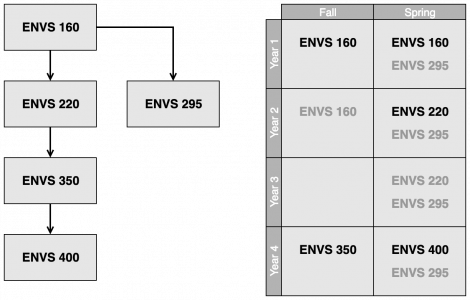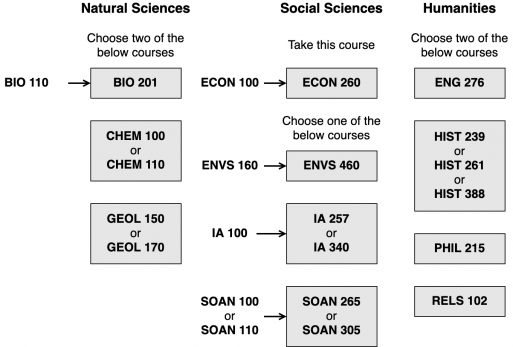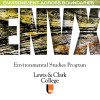Major prior to 2022-23 catalogue
The information below is for students who declared their ENVS major prior to the 2022-23 catalog adoption.
The Lewis & Clark course catalog has complete information about majoring and minoring in environmental studies. A summary of the ENVS Program, and much of the below, are also available as a one-page PDF.
Summary
The major requires a minimum of 46 credits including:
- 21 credits of ENVS core courses. Four courses—ENVS 160 (Introduction to Environmental Studies), ENVS 220 (Environmental Analysis), ENVS 350 (Environmental Theory), and ENVS 400 (Senior Seminar)—are designed as an interdisciplinary sequence, while ENVS 295 (Environmental Engagement) builds skills in communication and action.
- 25 credits of ENVS breadth courses. These courses, offered by contributing departments outside the ENVS program, span the natural sciences, social sciences, and humanities, offering majors multidisciplinary breadth.
The major also includes an advisory area of interest, designed by each student as part of ENVS 220, Environmental Analysis, to explore and build expertise in a focus area of their choice. All majors present an area of interest update before they design a related capstone in ENVS 400, Senior Seminar.
ENVS-related courses
Environmental studies is a highly interdisciplinary field drawing upon the full range of the liberal arts. Lewis & Clark’s ENVS curriculum offers students breadth with depth, via three key components:
- Core courses are designed to weave together concepts and skills drawn from breadth course fields, in order to build an intellectually coherent understanding of environmental problems and solutions. The core sequence starts with a broad introductory course followed by development of quantitative and qualitative analytical skills and advanced treatment of environmental theory. It culminates in a senior capstone representing original scholarly research on a topic of practical relevance. An additional core course builds communication, cultural competency, and other skills toward successful public engagement.
- Breadth courses in fields including biology, chemistry, English, earth system science, economics, sociology and anthropology, international affairs, history, philosophy, and religious studies provide important discipline-specific tools for environmental analysis.
- Majors receive faculty guidance toward areas of interest relevant to their academic and professional goals, and are encouraged to pursue overseas study, ideally related to these areas of interest, during their third year.
Planning the major/minor
Students interested in an ENVS major or minor should work with their College Advising Center advisor or CAS faculty advisor to develop an academic plan that includes all requirements below. We ask that you choose the “Share with Lewis & Clark College” option at bottom of Share on this academic plan sheet so that ENVS faculty can readily access it. When developing this plan, students should check the ENVS future course sheet to ensure that a desired course is offered for a given semester and year.
Core course sequence
The following core courses are required, with satisfaction of new GE requirements noted:
- ENVS 160 Introduction to Environmental Studies (4 credits; GP)
- ENVS 220 Environmental Analysis (5 credits; BRW)
- ENVS 295 Environmental Engagement (4 credits; CPI)
- ENVS 350 Environmental Theory (4 credits; BRW, CPI)
- ENVS 400 Senior Seminar (4 credits)
Below are diagrams of the core course sequence and a four-year schedule, with required/recommended course timing in dark font, and optional timing in gray.

Breadth course options
In addition, the major requires two breadth courses from the natural sciences, two from the social sciences, and two from the humanities, of which no two courses may have the same departmental prefix. These courses satisfy the new GE requirements as noted below.
The two natural science courses, any of which satisfy the Natural Sciences GE requirement, include:
- BIO 201 Biological Core Concepts (prerequisite: BIO 110 Investigations in Biology)
- CHEM 100 Perspectives in Environmental Chemistry
- or CHEM 110 General Chemistry I
- ESS 150 Environmental Geology
- or ESS 170 Climate Science
Two social science courses are also required, including:
- ECON 260 Environmental and Natural Resource Economics (prerequisite: ECON 100 Principles of Economics)
plus one of the following social science courses:
- ENVS 460 Environmental Law & Policy
- IA 257 Global Resource Dilemmas (prerequisite: IA 100 Introduction to International Relations)
- or IA 340 International Political Economy (prerequisite as above)
- SOAN 265 Critical Perspectives in Development (GP; prerequisite: SOAN 100 Introduction to Sociology or 110 Introduction to Cultural Anthropology; both CPI)
- or SOAN 305 Environmental Sociology (prerequisite as above)
Two of the following humanities courses are also required:
- ENG 276 Animals and Animal Rights in Literature (BRW, CA, HP)
- HIST 239 Constructing the American Landscape (CPI)
- or HIST 261 Global Environmental History (CPI, GP, HP)
- or HIST 388 What’s for Dinner (CPI, GP)
- PHIL 215 Philosophy and the Environment (CPI)
- RELS 102 Food and Religion in America (HP)
Breadth courses may also potentially be satisfied by transfer of equivalent courses, via a course substitution form.
Below is a diagram of ENVS breadth courses, with prerequisite courses at left; please consult the college catalog for other prerequisites.

All Lewis & Clark courses intended to fulfill environmental studies major requirements must be taken for a letter grade, with the exception of ENVS 244 Practicum.
Although not required for the major, all environmental studies majors are strongly urged to complete MATH 131 Calculus I.
Minor requirements
A minimum of 25 semester credits (six courses), distributed as follows:
- ENVS 160 Introduction to Environmental Studies
- ENVS 220 Environmental Analysis
- ENVS 295 Environmental Engagement
- One natural science breadth course chosen from the above list
- One social science breadth course chosen from the above list
- One arts and humanities breadth course chosen from the above list
All Lewis & Clark courses intended to fulfill environmental studies minor requirements must be taken for a letter grade.
Environmental Studies is located in room 343A of John R. Howard Hall on the Undergraduate Campus.
MSC: 62
email envs@lclark.edu
voice 503-768-7790
fax 503-768-7620
Symposium Advisor Jessica Kleiss
Environmental Studies
Lewis & Clark
615 S. Palatine Hill Road MSC 62
Portland OR 97219
